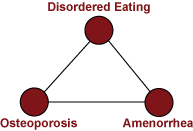Menstrual Cycle
Female athletes age 16 and older should monitor their menstrual periods to ensure they are regular.
If for any reason you are not menstruating by the age of 16, or your periods started and then stopped, it is important to give the following information to your parents, your coach, your family doctor, or another health professional that you trust.
Sometimes, female athletes have a very low amount of body fat. This can cause problems in their hormonal chemistry and create a three-pronged women’s health issue called the female athlete triad.
The female athlete triad is a cycle. The lack of nutrition resulting from disordered eating can cause the loss of several or more consecutive periods. This in turn leads to calcium and bone loss, increasing the athlete’s risk for stress fractures of the bones. Each of these conditions is a medical concern. Together they create serious health risks that may be life-threatening. While any female athlete can develop the triad, adolescent girls are most at risk because of the active biological changes and growth spurts, peer and social pressures, and rapidly changing life circumstances that go along with the teenage years.
Disordered Eating
 Disordered eating often begins as a preoccupation with losing and gaining weight or muscle, or an intense fear of becoming fat. It is considered disordered eating when this fear or concern leads to abnormal eating and exercise patterns.
Disordered eating often begins as a preoccupation with losing and gaining weight or muscle, or an intense fear of becoming fat. It is considered disordered eating when this fear or concern leads to abnormal eating and exercise patterns.
Loss of Menstrual Periods (Amenorrhea)
When an athlete over-trains, does not eat properly or does not have enough body fat, she may lose her ability to menstruate. Amenorrhea is when an athlete misses her period for at least three months or hasn't had a menstrual period by age 16.
Weak Bones (Osteoporosis)
If an athlete’s body isn’t producing enough hormones (like estrogen), her body will not be able to replace old bone cells with healthy new cells. This weakening of the bones is called osteoporosis. Osteoporosis is common in older women after menopause, but young female athletes who don’t eat enough food or who over-train are also at risk.
How You Can Prevent the Triad and Stay Healthy and Well:
- Eat a variety of foods every day- including foods with fat in them.
- Don’t exercise too much. Make sure you take rest days.
- Tell your doctor about any changes in your menstrual periods.
- Ignore advice about dieting and controlling your weight.
- Learn about disordered eating.
- Read the BodySense website!